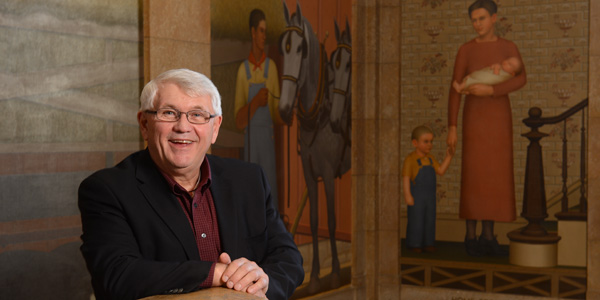
Iowa Farmers As Policy Partners, Entrepreneurs, Optimists
Sometimes it is fun to reflect back on how things have changed and how other things have remained the same. Given my 33 years at ISU, and my long tenure with the annual Iowa Farm and Rural life Poll, I was asked to give voice to major themes of rural Iowa and how they’ve changed. As I dug through the reams of reports and data, enduring qualities of the state’s farm community surfaced from throughout the past three decades.
When the first Iowa Farm and Rural Life Poll report was issued in 1982, it was evident Iowa producers were distrustful of government policies. In that first poll, nearly 9 out 10 farmers agreed “farmers are being left out of many important agricultural decisions” and 85 percent agreed “farmers cannot count on government assistance.”
Just ahead of what was eventually termed the “Farm Crisis” of the 1980s, farmers were anxious about the future.
In this survey 42 percent felt it was likely the quality of life for farmers would decline in the next five years, and 54 percent predicted overall economic prospects for farmers would worsen. While none of us were able to accurately predict the severity of the economic downturn that eventually unfolded, farmers sensed things were going to get worse.
Thus, the first lesson I learned from the Farm Poll was how accurate the collective wisdom of a scientific random sample could be.
That first survey added a second observation: “It is impossible to place farmers into a single category.” Whenever anyone talks about farmers, I question what subgroup of farmers they are referring to: row crop farmers, livestock producers, fiscally conservative or socially liberal, well-established or beginning, or another subgroup? Farmers are a very diverse group. Sometimes they share a common vision, but other times they are diametrically opposed.
A third observation from my years polling farmers is they are an independent group—independent thinkers, entrepreneurs and often quite vocal in expressing their opinions. Throughout the years many producers have shared their reactions to the polls, submitted their ideas for future surveys and, from time-to-time, soundly criticized the methodology or wording of questions. They leave little doubt about their level of passion about rural life, farming and community.
Throughout the history of the Iowa Farm and Rural Life Poll have been many examples of the resiliency of farm families. Through good times and bad there has always been a glimmer of hope things will improve. Perhaps it is this eternal flame of optimism that keeps farmers doing what they love.
One of the great ironies is often one only hears about tough times, low yields and weak prices, but when we’ve asked farmers “if they had enough money to live comfortably, would they continue farming?” nearly two-thirds said they would continue to farm. While it is not fashionable to claim one loves their job, it’s pretty clear farmers are passionate about their occupations and share their love of agriculture. Their passion is often tied closely to family tradition and legacies, land ownership and stewardship.
A final observation is based on both the first and the most recent poll results: Iowa farm families want to be included in setting the agenda for agriculture and their rural communities. They have been partners in this long-term project and continue to share their stories and opinions with Iowa State University through the Iowa Farm and Rural Life Poll, for which all of us are grateful.



